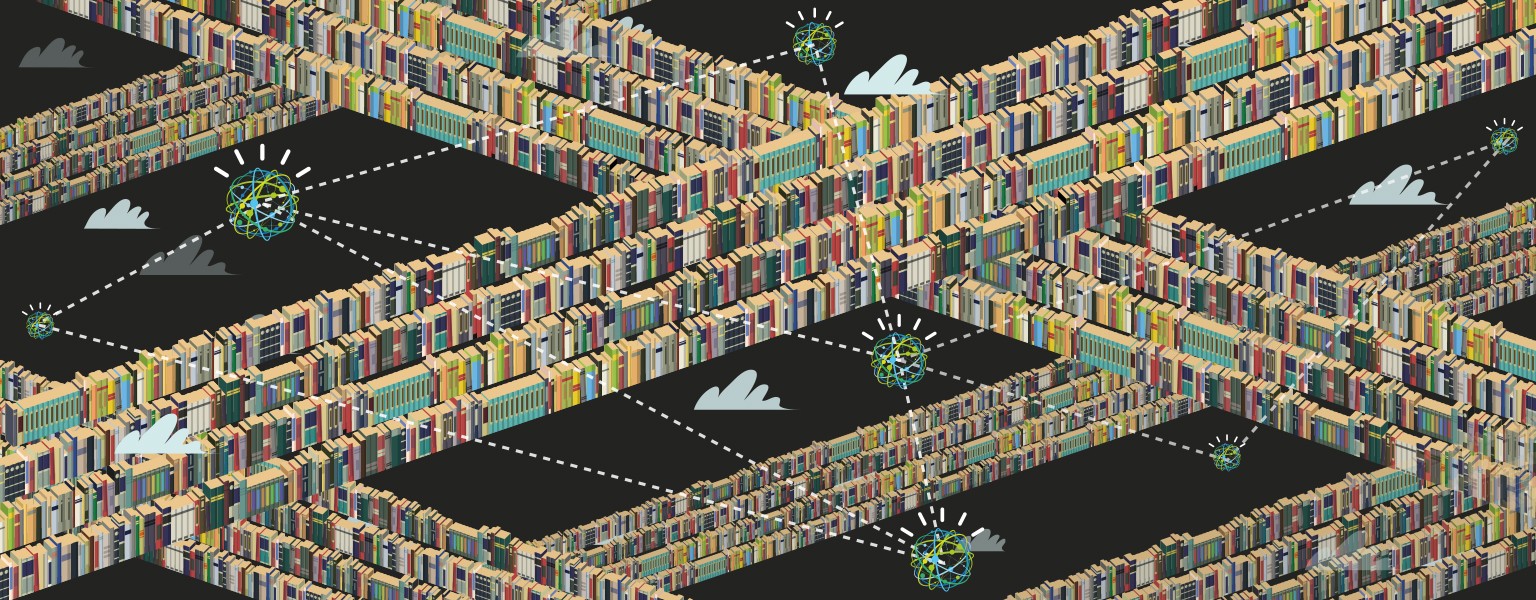We read in a library. Watson actually reads the library. (Illustration: James Boast)
- A Cure for the Common Meeting
- Big Data and Hollywood:
A Love Story - The Race to Probe the Twittersphere
- Watson Takes The Stand
We live in a world increasingly run by algorithms. They drive the lion’s share of all equity trades and automate complex hedges and derivatives. They make love matches, set retail prices, sequence traffic lights and air traffic, predict ticket sales by "reading" scripts, diagnose diseases, prescribe drug protocols and identify suspected terrorists for no-fly lists. At Google, they’re learning to drive, which could eventually prevent tens of thousands of highway deaths every year.
Algorithms are critical to most of the things we now call smart, like cars and phones and grids. And they’ve made computers so smart we need a new word for them. About the only thing these “computers” have in common with what’s on your desk are silicon chips.
Their processors are called “neuromorphic” because they mimic the human nervous system, just as the latest “neural network” algorithm does. As a result, these “computers” can see, speak, listen, think and learn. Given certain questions and problems, particularly those relying on perfect memory and lightning speed with massive amounts of data, they are helping to make major advances in fields ranging from economics and engineering to medicine and basic science.
And now they’re getting around to lawyers.
Later this year, a small Canadian company is scheduled to introduce its “digital legal advisor” to the world’s law firms. Its name is ROSS (which actually doesn’t stand for anything). “The way you interact with ROSS is very simple,” says Jimoh Ovbiagele, one the co-founders. “You just ask it a question as you would ask another human being. This is very different from current legal research technologies where you type in keywords and it retrieves documents that have those keywords. ROSS doesn’t retrieve thousands of documents for you to sift through. It gives you an evidence-based response.”
In law firms, the word “research” is a vague umbrella term that refers to all the database mining, web surfing and trips to the law library to find the relevant legal background and precedents in a particular case. In general, it’s grunt work, and it often gets thrown, at least at first, to associates and paralegals. Traditionally, when it comes time for a client to pay, the time spent researching gets bundled in with the hours racked up by senior level attorneys. But that is starting to change.
“People are reassessing the structure in place which revolves around the billable hour,” says Andrew Arruda, another of the ROSS co-founders. “A lot of clients have refused to pay for the time spent doing research. They see it as part of what you should be doing anyway.” He and his co-founders built ROSS in part to pick up some of that work.

A Conversation with John Gordon, Vice President, IBM Watson Solutions
What do most people misunderstand about Watson?
Watson is not one system. It’s not one supercomputer. It’s a set of services in the cloud that can be used and can be trained. All these Watson systems are learning systems.
Our main view here is there are industries where people are overwhelmed with information and they can’t keep up with what’s happening. So they can be trained by different entrepreneurs or enterprises for whatever use they need them to do.
How big of an impact can Watson make?
Watson is going to transform industries and professions—all kinds of industries. Specifically, healthcare was one we said, legal was two, and education was three—all of those industries being big data intensive, substantial industries.
So how is IBM getting that transformation underway?
We have a set of Watson APIs we put on a developer cloud. And those are services that people can build other applications on, whether they’re in veterinary medicine or in charitable giving or in legal. We’ll see lots of people that will do those. We have over 6,000 app that are under development on the Watson developer cloud.
We’ll combine both the types of services that are available on that developer cloud as well as things that we still have from the lab where we spent over 6 billion dollars a year on research.
Can you describe what Watson actually does?
All of these different services start to mimic the way that people interact with the world, whether it’s understanding sight or language or personality. And they learn.
How do they learn?
Watson always trains with experts so that it gets up to speed. Then people who are using it, when they see answers from Watson, they can say they think it’s right, they think it’s wrong, [or] they think it’s kind of right. But they get to provide their point of view so that the system can use it to improve.
We want these learning systems to be able to learn from the people that are teaching them. They train and teach it so that it then specifically applies to them and it’s unique to them. So, two systems that start off with the same generic service can be trained to be dramatically different by the time they’re done.
And they couldn’t have done it without Watson, the most famous thinking apparatus of them all—the one whose father beat Gary Kasparov at chess and who itself four years ago bested the winningest Jeopardy contestants in the history of the show.
Since that remarkable public victory, Watson has travelled to Africa to act as a financial, agricultural and medical advisor to an entire continent of business partners, and more recently to Japan, where it will learn the Japanese language for the first time. It has helped banks around the world create new services, and it’s now being taught by world-renowned experts in the field of oncology how to match patients to the most effective treatment plans.
It was a commercially available Watson API that begat ROSS.
Although it is commonly thought of as a monolithic supercomputer, the Watson technology is a cognitive system that does not actually exist as a single entity. Through its developer cloud, IBM has already made available 13 different Watson APIs, each adept at a different specialty that developers can build on to create a cloud service. There’s one that’s a master of communication styles. There’s one that recognizes and analyzes visual input. There’s one that’s really good at weighing the pros and cons of a complex situation.
According to John Gordon, vice president of innovation for the IBM Watson Group, more than 6,000 beta apps have been built off the Watson Developer Cloud. The API that ROSS uses is called “Question and Answer.” Its strengths are very similar to those that helped Watson obliterate its competition on Jeopardy. It can understand a complex question, look through a vast database of stored documents and then give you, in simple, natural language, the right answer (or, in Jeopardy’s case, the right question).
Even so, it was up to the Ross team to help train Watson about legal principles or case law. “It was almost like an infant,” says Ovbiagele. “It didn’t know anything, so what we were tasked with doing was providing Watson information and teaching it how to read that information including laws, legislation and court decisions.”
“The really amazing part about it is that it also learns through use,” says Arruda. Every time it answers a question, ROSS asks for feedback on its performance. Over time, as experts chime in on how it’s doing, ROSS’s answers become more representative of the answers you would have gotten from the human professionals themselves. This is one of the primary features of all Watson progeny.
Of course, one question burns bright in the minds of recent law school grads—is Watson here to take away all the entry-level positions? Richard Susskind, an author who has been thinking, writing and talking about these issues for his entire career, repeatedly admonishes people in the legal profession not to try holding onto their grunt work.
“The law is no more there to provide a living for our lawyers than ill health is there to provide a living for doctors,” he recently told an audience at the University of Southampton. “It’s not the purpose of the law to keep lawyers in business.”
“In medical and healthcare, we looked at what an oncologist would need to do to find data that helps them make a good decision,” says IBM’s Gordon. “They don’t want the systems to make decisions. They want the system to help wade through all the data that exists and put the relevant pieces in front of them so they can make better decisions. And we think that same model that worked very effectively in healthcare passes over into law.”
At the moment IBM is looking for the right partners and institutions that will give Watson the best legal education. In the future, you can expect to see autonomous legal aides that go beyond just answering simple questions, digital paralegals that can actually help lawyers devise new strategies for their cases.
But first, says Gordon, Watson must go back to school.

